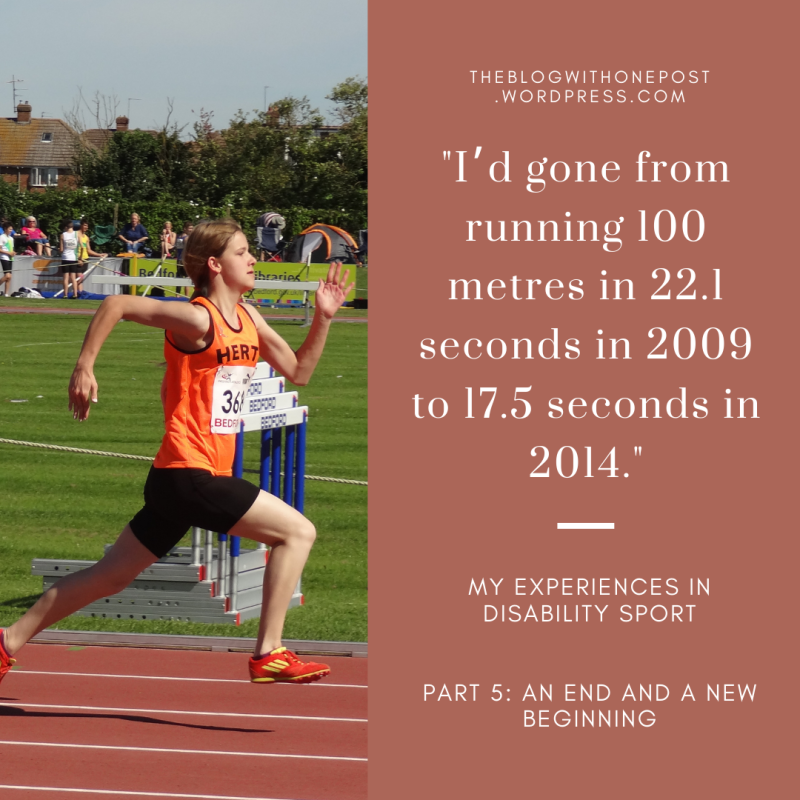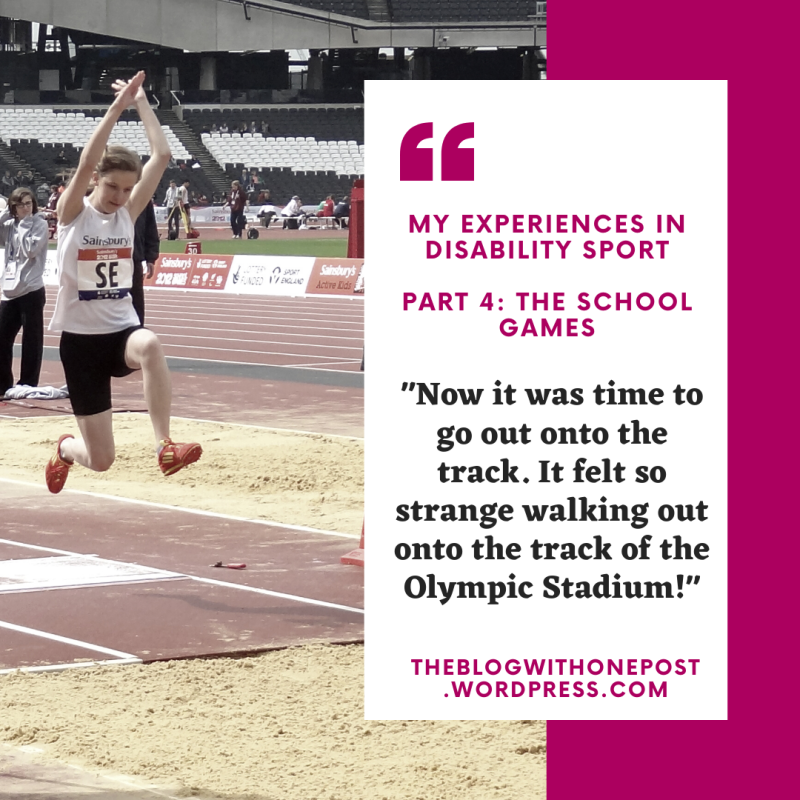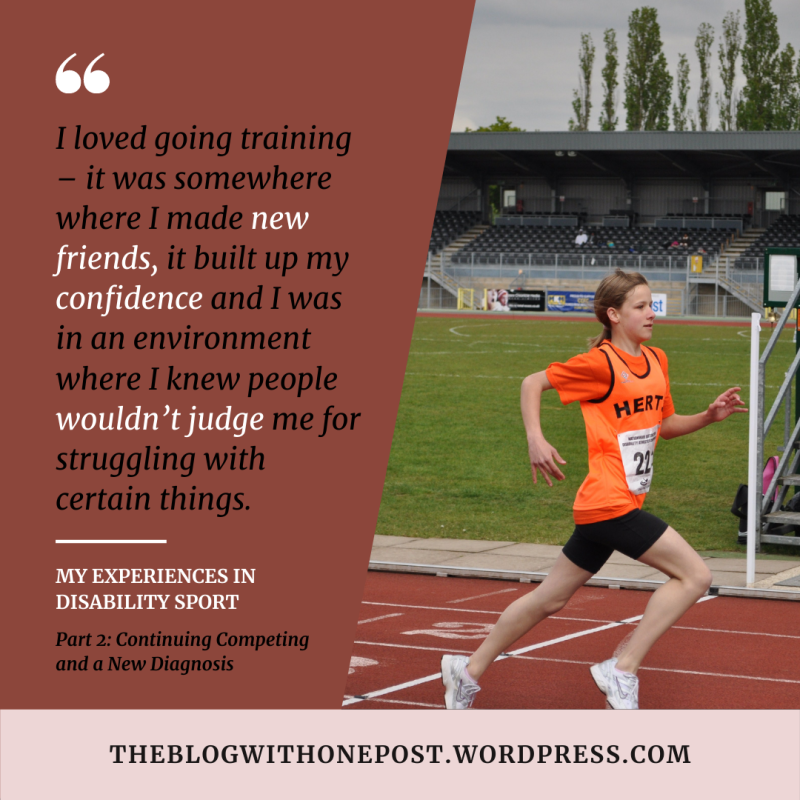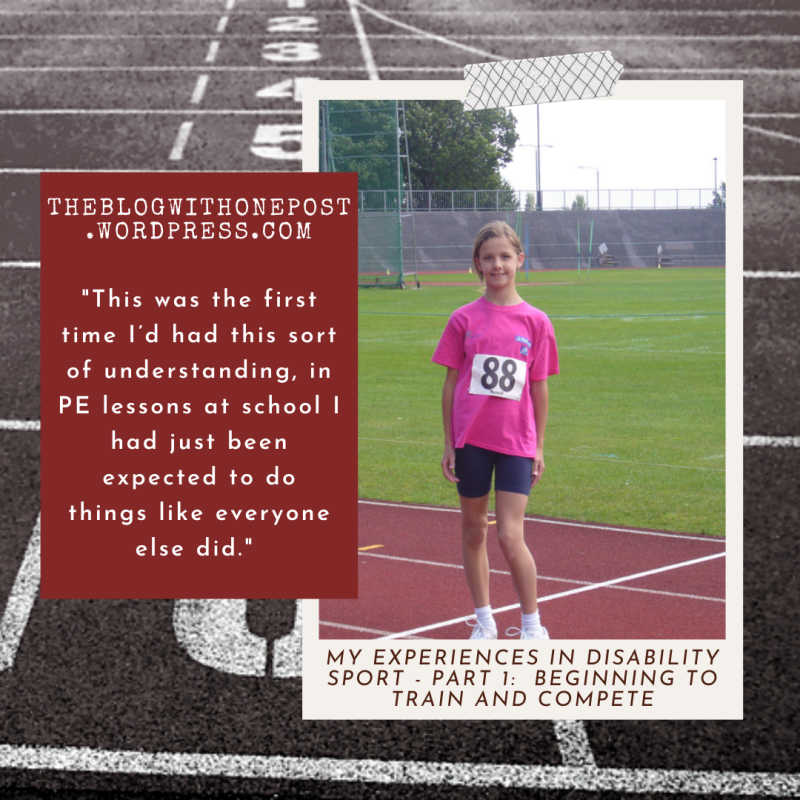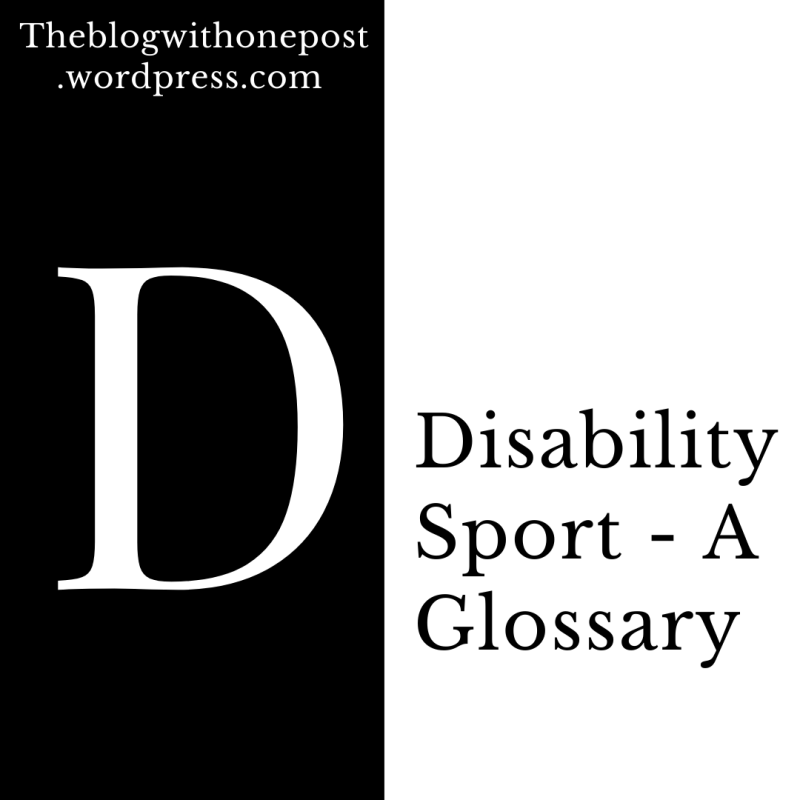Previous posts on disability sport:
As I mentioned in my previous post, having a national classification meant that I was now able to take part in so many more competitions. In 2011 I took part in competitions in Lee Valley, Perivale, Mile End, Bedford, Cardiff and Nottingham. I also took part in CP Sport training days in Nottingham during the Winter.
Looking back, I was so lucky to have had those opportunities – we had a great team (not a lot of places have specific disability athletics squads), most of the coaches at the club were volunteers and we often travelled together to these competitions by minibus, also driven by volunteers (including my Dad). And, of course, my Dad and brother would also come along to all these competitions and training sessions, in all sorts of weather! Although no matter the weather, my bright orange running spikes always stood out! These were technically middle distance spikes but because I’m flat footed it was decided that these would be better for me as they had more cushioning.
Part of realising how flat footed I was came from filming my running in slow motion. Doing this was really useful, as it allowed me to analyse my technique. For example, I was able to see that when I ran I brought my legs out and round slightly rather than straight forward. It was also useful when practicing the start of the race, as I found out that I had a tendency to move backwards slightly before going forwards!
As well as training at the track, there was a period of time in around 2011/2012 when I started taking part in some extra training sessions at home. I’m lucky to live near a nature reserve which was ideal for hill sessions (or not so lucky, depending on what way you look at it!) I did enjoy it but I also used to get worried about seeing someone I knew whilst training and felt quite self conscious.
I think it was also around 2011 when some people in my athletics squad were selected to be part of a talent ID squad in Manchester. Although I did win medals at some competitions, I certainly wasn’t one of the best in my classification and wasn’t at the same level as some of my friends in the squad were. On Facebook, when I was around 13, my response to the question “What would your dream be?” was “To compete in the Paralympics”. Realistically, I definitely wasn’t at this level!” I did begin to realise this more, not that it would stop me from training/competing – athletics was something I did because I enjoyed doing it, not for any other reason. I had also managed to improve my times/distances that year and had finally reached over 3 metres for long jump! Getting a new PB and finally reaching a certain target always felt like a sense of achievement.
Although I’m not sure of the exact dates of when I started, I also used to take part in a few other disability sports alongside athletics. I took part in swimming, initially for fitness to go alongside my athletics training, but I did take part in a couple of competitions too. I eventually stopped taking part in swimming though as I found that I wasn’t really enjoying it. Everyone’s different though – I know other people who have dyspraxia who enjoy swimming but hate running. I’m just the opposite way round!
One sport I did really enjoy was wheelchair basketball. I don’t think I know anyone who has tried wheelchair basketball and said they didn’t like it, it’s great fun! I took part in it as a recreational sport, it was just for fun, and I wouldn’t have been eligible to take part in it at a higher level (for people with a greater severity of disability). However, I did take part in a couple of local competitions, which were open to a wider range of disabilities. There were also basketball competitions which involved a combination of people using wheelchairs in the middle and those running along the sides, a good opportunity for inclusive sport. If you ever get the opportunity to try wheelchair basketball I would definitely recommend it!
The other disability sport I took part in is one which you may not have heard of (unless you read my glossary!) – boccia. Boccia is similar to bowls, but is played seated. It is another sport where only people with more severe physical disabilities are eligible to take part at a high level, but local competitions are often open to people with a wider range of disabilities. Believe it or not, my first time playing boccia was actually at a competition! I think it was a situation where they needed an extra player at the last minute and I was asked if I would like to play. Both the boccia and wheelchair basketball clubs were run by the same group of people who organised the athletics club, so they already knew me. I did find myself in some random scenarios when taking part in disability sport, including the times where for fundraising we played seated volleyball outside my local Sainsbury’s and wheelchair basketball in the town centre!
After taking part in the boccia competition, I found that it was something I really enjoyed so I trained regularly for that and took part in a few local competitions. It’s funny because boccia involves judging distances and how much force to apply, something which I often find difficult due to dyspraxia, but surprisingly I enjoyed boccia. Athletics was always the main sport I took part in and the sport I took part in for the longest but I did also enjoy taking part in these other sports.
Going back to athletics, it was in 2012 when people in my athletics squad were selected for the Paralympic Test event, one of the first competitions to be held at the Olympic Stadium in Stratford. I wasn’t selected for this but later found out that I had been selected to take part in the 2012 School Games – which were also to be held at the Olympic Stadium! I was delighted, not only was it the biggest competition I had taken part in but also the opportunity to compete in the Olympic Stadium was incredible! I had a lot of preparation to do before then though – I would be taking part in the ambulant long jump, so it was time to practice my technique!
I’ll be talking more about the School Games in my next post. In fact, the entire post will be dedicated to it!
Natalie 🙂
Previous posts on disability sport: Disability Sport – A GlossaryDyspraxia and Disability Sport – An Introduction and a Guide to ClassificationMy Experiences in Disability Sport – Part 1: Beginning to Train and CompeteMy Experiences in Disability Sport – Part 2: Continuing Competing and A New DiagnosisMy Experiences in Disability Sport – Part 3: New OpportunitiesMy…
Previous posts on disability sport: Disability Sport – A GlossaryDyspraxia and Disability Sport – An Introduction and a Guide to ClassificationMy Experiences in Disability Sport – Part 1: Beginning to Train and CompeteMy Experiences in Disability Sport – Part 2: Continuing Competing and A New DiagnosisMy Experiences in Disability Sport – Part 3: New Opportunities…
Previous posts on disability sport: Disability Sport – A GlossaryDyspraxia and Disability Sport – An Introduction and a Guide to ClassificationMy Experiences in Disability Sport – Part 1: Beginning to Train and Compete After finding out that disability sport was something I enjoyed, I continued training during the winter. It did get very cold and…
Previous posts on disability sport: Disability Sport – A GlossaryDyspraxia and Disability Sport – An Introduction and a Guide to Classification During primary school I hated PE. I was slow at getting changed into my PE kit, I was slow at running, I struggled to catch a ball. I did not enjoy sports day at…
Previous post on disability sport: Disability Sport – A glossary Sport… something which seemingly involves good balance, coordination, motor skills, and spatial awareness. To some it may sound like a dyspraxic’s worst nightmare! This was the view I had of sport for quite a few years, up until I got into disability sport where the…
In sport there is often a lot of terminology to get your head around and even more so when it comes to disability sport! So I thought I would include a glossary which you can refer to when reading my series of blog posts on disability sport.





